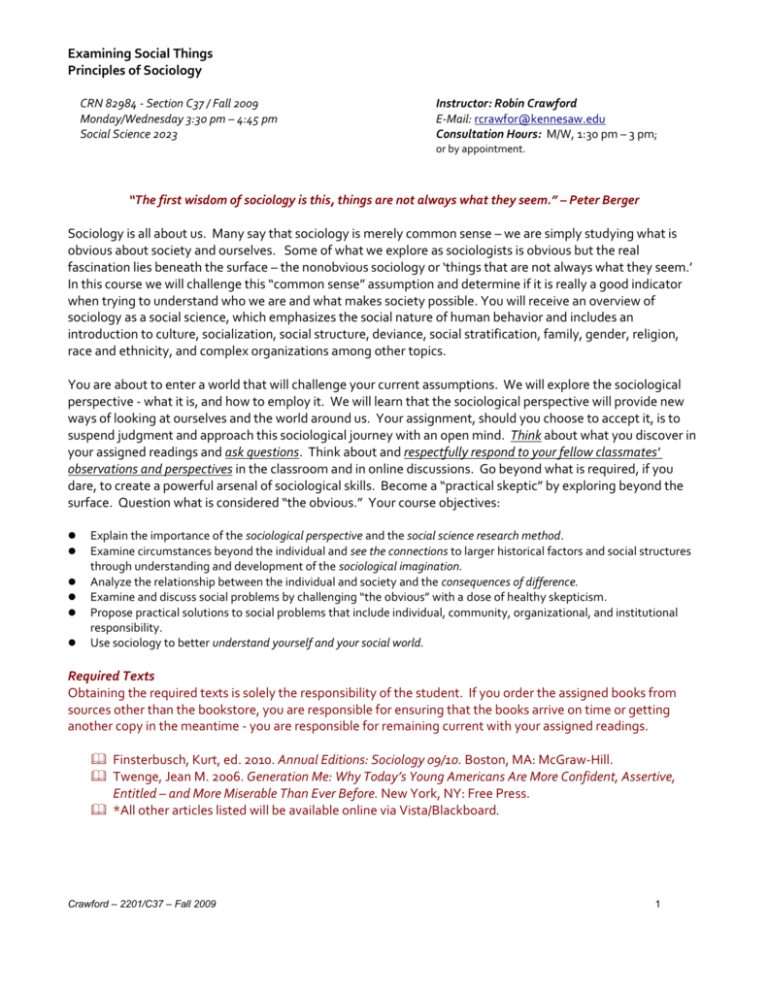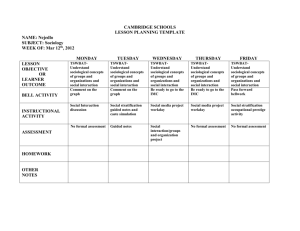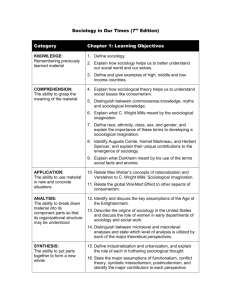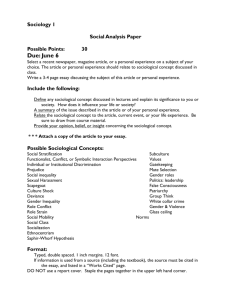
Examining Social Things
Principles of Sociology
CRN 82984 - Section C37 / Fall 2009
Monday/Wednesday 3:30 pm – 4:45 pm
Social Science 2023
Instructor: Robin Crawford
E-Mail: rcrawfor@kennesaw.edu
Consultation Hours: M/W, 1:30 pm – 3 pm;
or by appointment.
“The first wisdom of sociology is this, things are not always what they seem.” – Peter Berger
Sociology is all about us. Many say that sociology is merely common sense – we are simply studying what is
obvious about society and ourselves. Some of what we explore as sociologists is obvious but the real
fascination lies beneath the surface – the nonobvious sociology or ‘things that are not always what they seem.’
In this course we will challenge this “common sense” assumption and determine if it is really a good indicator
when trying to understand who we are and what makes society possible. You will receive an overview of
sociology as a social science, which emphasizes the social nature of human behavior and includes an
introduction to culture, socialization, social structure, deviance, social stratification, family, gender, religion,
race and ethnicity, and complex organizations among other topics.
You are about to enter a world that will challenge your current assumptions. We will explore the sociological
perspective - what it is, and how to employ it. We will learn that the sociological perspective will provide new
ways of looking at ourselves and the world around us. Your assignment, should you choose to accept it, is to
suspend judgment and approach this sociological journey with an open mind. Think about what you discover in
your assigned readings and ask questions. Think about and respectfully respond to your fellow classmates'
observations and perspectives in the classroom and in online discussions. Go beyond what is required, if you
dare, to create a powerful arsenal of sociological skills. Become a “practical skeptic” by exploring beyond the
surface. Question what is considered “the obvious.” Your course objectives:
Explain the importance of the sociological perspective and the social science research method.
Examine circumstances beyond the individual and see the connections to larger historical factors and social structures
through understanding and development of the sociological imagination.
Analyze the relationship between the individual and society and the consequences of difference.
Examine and discuss social problems by challenging “the obvious” with a dose of healthy skepticism.
Propose practical solutions to social problems that include individual, community, organizational, and institutional
responsibility.
Use sociology to better understand yourself and your social world.
Required Texts
Obtaining the required texts is solely the responsibility of the student. If you order the assigned books from
sources other than the bookstore, you are responsible for ensuring that the books arrive on time or getting
another copy in the meantime - you are responsible for remaining current with your assigned readings.
Finsterbusch, Kurt, ed. 2010. Annual Editions: Sociology 09/10. Boston, MA: McGraw-Hill.
Twenge, Jean M. 2006. Generation Me: Why Today’s Young Americans Are More Confident, Assertive,
Entitled – and More Miserable Than Ever Before. New York, NY: Free Press.
*All other articles listed will be available online via Vista/Blackboard.
Crawford – 2201/C37 – Fall 2009
1
P
A
G
E
Recommended Reading
Evans, Mary. 2007. A Short History of Society: The Making of the Modern World. New York, NY: The
McGraw-Hill Companies.
Berger, Peter L. 1963. Invitation to Sociology: A Humanistic Perspective. New York, NY: Anchor Books.
Langer, Ellen J. 1989. Mindfulness. Jackson, TN: Perseus Publishing.
Browne, Neil M. and Stuart M. Keeley. 2007. Asking the Right Questions: A Guide to Critical Thinking. 8th
ed. Upper Saddle River, NJ: Pearson Prentice Hall.
Course Information/Expectations
This course requires heavy use of Vista/Blackboard. Students must have access to and know how to use
Microsoft Word, as all of your assignments will be forwarded as attachments via the “Assignment” link in
Vista/Blackboard. Learning how to effectively use both of these tools will be addressed in our first meeting.
Proficient use of these tools will significantly enhance your learning experience and assignment grades. This is
a college-level academic course; as such, you are expected to read all of the assigned material each week,
analyze content, use sociological concepts and theories, and pay attention to spelling, punctuation, grammar,
and sentence structure when completing assignments and tests. Use the Chicago Style Guide when
composing all writing assignments (link posted on Vista/Blackboard).
As you read the assigned materials, ask:
What does the author think? Why?
What do I think? Why?
What does the research reveal?
Whose truth is in the numbers?
As you analyze our social world you will have several opportunities to demonstrate your understanding of
sociological concepts and theories through writing assignments, in class and online discussions, and tests. In
addition to the required reading, you may watch films and popular animated television shows, analyze popular
music, critique short articles, and exercise the sociological perspective on a number of current news events.
Attendance
Attendance is essential for successful completion of this course. Some of the material covered in class will not
be found in the readings; therefore if you miss class, you miss important information directly connected to your
overall success in the class. Past experience has revealed that relying on the notes from other students does
not work, as you will miss key points. Additionally, I will not make a special effort to bring you up to date on
information and materials missed – please consult with one of your group members. Note: For each class, it is your
responsibility to sign the attendance sheet; if you are not in class or if you forget to sign, you will be marked absent.
You are expected to arrive to class prepared and on time, just as you expect me to arrive prepared and on time.
Class Participation
In class and online participation is required. To maximize your learning experience, you are expected to read all
of the assigned material BEFORE attending class. Be assured that lectures and class discussion will go beyond
what is assigned in the readings. Your preparation ahead of time contributes to class discussions in a
meaningful way. In fact, a significant portion of your learning will come from interacting online and in-class
with your fellow classmates.
Class Manners
Not to be condescending, as most of you already know and adhere to these basic rules of civility, but for those
of you who have managed to get by without following these basic rules to date:
Crawford – 2201/C37 – Fall 2009
2
P
A
G
E
Please be courteous and adjust your cell phones to vibrate and/or silent. If you are expecting an emergency
call, put your cell phone on vibrate and please leave the classroom when you receive your call - do not
attempt to talk quietly in your seat.
Laptops are welcome for note taking, however, instant messaging and web surfing while in class are not –
please do not be rude to the instructor and your fellow classmates by engaging in these activities while class
is in session. Violation will result in the banning of all laptops in class.
Do not come to class to sleep, your bed at home is a lot more comfortable!
Assignments have due dates, please familiarize yourself with them.
Excessive use of profanity and/or the degradation of specific individuals or groups in any class discussion or
assignment will compromise your grade.
Sociologists look for patterns and what is typical. There will be times when your personal experience will
differ from what we are discussing in class. Some of what will be discussed will go against popular belief.
Although interesting, personal experience or anecdotal evidence is not sufficient to prove a point. So, if you
did not review the assigned material, please do not argue about an issue.
Technology
Vista/Blackboard will be used for announcements, assignments, and other pertinent materials. You will also be
able to check grades, communicate with fellow classmates, communicate with me through e-mail, and access
additional links to articles, etc. You should be checking Vista/Blackboard at least twice a week to stay current.
When you have a question, comment, complaint, concern, or you just want to say how much you are enjoying
your learning experience , post on the “Ask the Instructor” discussion board so that the class can benefit
from the question or comment and response. For personal matters e-mail me through Vista/Blackboard.
My goal is to respond within 24 hours (Monday – Friday) to e-mails that don't require effort beyond a quick
response. If your e-mail requires additional effort beyond a quick response, my goal is to respond as soon as
possible. If you need to use my university e-mail, include your last name - course, and section in the subject
line (ex. Crawford – Sociology 2201/11).
Academic Honesty and Plagiarism
I conform to the rules listed in the Undergraduate Catalog concerning cheating. Please familiarize yourself with
your rights and responsibilities. Any student caught cheating automatically receives a zero for the exam or
assignment and will not be given a chance to make it up. The submission of the work of someone else as one's
own is plagiarism. Academic honesty requires that ideas or materials taken from another course for use as a
course paper or project be fully acknowledged. Plagiarism is a very serious offense in whatever form it may
appear, be it submission of an entire article falsely represented as the student's own, the inclusion within a
piece of the student's writing of an idea for which the student does not provide sufficient documentation, or the
inclusion of a documented idea not sufficiently assimilated into the student's language and style. It is your
responsibility to know and understand what constitutes plagiarism. Plagiarized assignments will receive a
zero - no exceptions.
Check out: http://www.youtube.com/watch?v=gC2ew6qLa8U and http://nutsandbolts.washcoll.edu/plagiarism.html.
Special Accommodations Notice
In accordance with University policy and the Americans with Disabilities Act (ADA), academic accommodations
may be made for any student who notifies the instructor of the need for an accommodation. It is imperative
that you take the initiative to bring such needs to my attention, as I am not legally permitted to inquire about
such particular needs of students.
General Course Strategy
Guidelines for your assignments will be posted on Vista/Blackboard including grading rubrics. Additional
information and tips will be available to help you get the most from your reading, writing, and class discussions.
Crawford – 2201/C37 – Fall 2009
3
P
A
G
E
Each student will be assigned to a class group named after an individual who influenced the growth of sociology.
Each week, you will be required to post a sociological reflection online - a place where you document your thoughts,
experiences, questions and answers about sociology throughout the semester - of approximately 200 words. A total
of twelve (12) reflections should be posted during the semester (merely posting 12 entries does not guarantee full credit;
follow the guidelines, as these should be sociological in nature, not merely a personal blog of your weekly activities). Begin
by submitting your first reflection by or before August 23rd at midnight (subsequent reflections should be submitted
each week by Sunday at midnight). Your final sociological reflection should be posted by or before November 29th at
midnight. Sociological reflections will be reviewed each week, however, a grade will not be assigned until the end of
the semester (one point will be deducted for each missing sociological reflection).
Review assignment guidelines for formatting specifics. All assignments should be typed and should include your
name, date, class, etc., 1” margins, double-spaced in the font of your choice. Please include your last name or group
name and page numbers in the footer of all of your papers. Papers will be evaluated based on content, use of sociological
concepts, structure, and mechanics, which includes integrating the Chicago documentation style (posted on
Vista/Blackboard).
Late assignments will be reduced 20% of the total grade received for each weekday (Mon. – Fri.) late. Late papers without
official documentation of illness or other emergency will not be accepted. Official documentation and a hard copy of the
late assignment MUST be turned in to the instructor. Please do not email me your excuse or assignments.
Summary of Evaluations
I treat assignments as they would be treated in the working world. No supervisor will tolerate an employee
turning in an expected report a day late or failing to present an oral presentation on the date anticipated.
Meeting deadlines is an important key to success as a student and as a professional in the working world. All
assignments are due on the specified due date. Failure to turn in the assignment or turning in only a portion of
the assignment will result in a 20% deduction per weekday. Grades are typically posted on Vista/Blackboard
within 10 business days (Mon. – Fri.) after the assignment/test is submitted.
Sociological Reflections (5%) - Each week you will sociologically analyze your assigned readings; personal experiences;
interactions; movies and television shows you have watched; books you have read; news events; observations of a public
place or special event; travel experiences, etc. (using concepts and theories learned in class) in an online discussion format.
You and your fellow classmates will post and respond to one another. It is a fun and interesting way to explore your social
world. You are required to complete at least fourteen (14) during the semester – one point will be deducted for each missing
sociological reflection. Due by Sunday at midnight of each week beginning August 30th; final post due November 29th at
midnight.
Desocialization Exercises (5%) – Socialization is the lifelong process by which culture is transmitted. We know that it is
possible to resocialize, but is desocialization possible? You will participate in a series of exercises designed to break free
from collective conditioning, which can be a start to observing yourself and your social world in new ways. After each
exercise, you are tasked with capturing your experience in an online journal.
Social Science Research (30%) - Sociologists employ the social science research method to expand our knowledge of the
social actor, the relationship between the social actor and society, and the consequences of difference. You will expand
your knowledge of some social phenomenon by conducting a mini research project (individual or group assignment)
designed to expand your knowledge through content analysis, field observation, or qualitative interviews. You/your group
will explore a social issue of interest, agree on an approach, analyze your data, draw some conclusions, and share your
findings in a paper or oral presentation (date TBD). Before you begin, each student is required to complete a mini course
on ethics in research and obtain an IRB Training Certificate (details posted on Vista/Blackboard). Presentations of your
research findings may be delivered to the class during the final exam period for extra credit points (business casual dress
required).
IRB Training Certificate due by midnight on Wednesday, September 23rd (3 pts.)
Proposals due by midnight on Wednesday, September 30th (2 pts.)
Final paper due by midnight on Monday, November 9th (25 pts.)
Crawford – 2201/C37 – Fall 2009
4
P
A
G
E
Sociological Book Review (10%) - Read the assigned book, Generation Me over the course of the semester (recommended
reading schedule below) and write a critical sociological book review (guidelines posted on Vista/Blackboard), due before
or by midnight Monday, November 23rd. We will discuss this fascinating topic as a class later in the semester.
Proposed “Generation Me” Reading Schedule
Week of 8/24 (Introduction)
Week of 9/21 (Chapter 4)
Week of 10/19 (Chapter 8)
Week of 8/31 (Chapter 1)
Week of 9/28 (Chapter 5)
Week of 10/26 (Appendix)
Week of 9/7 (Chapter 2)
Week of 10/5 (Chapter 6)
Week of 9/14 (Chapter 3)
Week of 10/12 (Chapter 7)
Tests (50%) – Three tests (comprehensive) will be administered online and graded on a progressive grading scale. Tests
will include a mixed format (i.e. essay, multiple choice, short answer, true and false) of 30 questions and will cover reading
assignments, class lectures, and class discussions. The timed tests (90 minutes) will be available for four days (between
Wednesday at 5 pm and Sunday at midnight). The tests will close at midnight on Sunday, no time extensions. Requests
for makeup tests without official documentation of illness or other emergency will be denied. Please do not email me your
excuse. All tests are due by Sunday at midnight on the specified dates below.
Test I – September 20th
Test II – October 25th
Test III – December 6th
Grade Distribution
Evaluation
Test I
Test II
Test III
Sociological Reflections
Desocialization Exercises
Sociological Book Review
Social Science Research Project
TOTAL
Points
5 pts
15 pts
30 pts
5 pts
5 pts
10 pts
30 pts
100 pts
Percentage
5%
15%
30%
5%
5%
10%
30%
100%
Grading Scale - 100-90 = A; 89-80 = B; 79-70 = C; 69-60 = D; 59 and below = F
Important Dates
August 12-13
Registration
October 12:
Last Day to Withdraw Without Academic Penalty
August 15:
First Day of Classes
November 25-29:
Fall Break - NO CLASSES, Wed. – Sun.
August 15 - 21:
Drop/Add
December 3:
Last Day of Classes
August 24:
Final Payment Deadline
December 4-10:
Final Exams
September 5-7:
Labor Day – NO CLASSES, Saturday – Monday
Crawford – 2201/C37 – Fall 2009
5
P
A
G
E
Course Schedule w/Reading Assignments and Sociological Reflection Dates
(*Posted on Vista/Blackboard)
(The instructor reserves the right to adjust the syllabus and course schedule as needed)
Week(s) of…
Topic for Discussion/Reading Assignment
8/17/09
Building a Sociological Foundation
- *How Does Your Positionality Bias Your Epistemology? (Takacs)
8/24/09
8/31/09
Sociology – History and Research
- A Short History of Society – Chapters 1-5 (Evans)
- *How Sociologists Do Research (Henslin)
- Telling the Truth About Damned Lies and Statistics (Best)
Sociological
Reflection
Due Dates
8/30/09
9/6/09
http://chronicle.com/free/v47/i34/34b00701.htm
9/7/09
9/14/09
Examining Our World with a Sociological Eye
- *The Sociology Eye and Its Blinders (Collins)
- The Promise (Mills)
9/13/09
9/20/09
www.leonardbeeghley.com/docs/SYG%202010/Mills,%20The%20Promise%20of%20
Sociology.pdf
9/21/09
9/28/09
10/5/09
Culture/Socialization/Desocialization
- Article 1 (Life in the USA); Article 2 (Society); Article 3 (Society); Article 7
(Thinking About Women); Article 8 (New Scientist Magazine); Article 10 (Milken
Institute Review);
*Adventures in Desocialization (This Book is Not Required)
*Queer Customs (Kluckhohn)
9/27/09
10/4/09
10/11/09
10/12/09
10/19/09
Societal Groups – From Micro to Macro
- Article 13 (Dissent); Article 18 (The Economist); Article 19 (Dissent); Article 29
(McGraw Hill); Article 32 (Mother Jones); Article 34 (Education Next); Article 35
(Business Week); Article 37 (Newsweek)
10/18/09
10/25/09
10/26/09
11/2/09
11/9/09
Social Stratification
- Article 4 (Educational Leadership); Article 16 (Current History); Article 20 (The
Nation); Article 23 (The Economist); Article 24 (Poverty and Race in America);
Article 25 (Psychology Today); Article 26 (The Wilson Quarterly); Article 27 (Ms
Magazine)
- Shadowy Lines That Still Divide (NY Times)
11/1/09
11/8/09
11/15/09
http://www.nytimes.com/2005/05/15/national/class/OVERVIEWFINAL.html?_r=1&pagewanted=all
11/16/09
11/23/09
No Class 11/25 – 11/29
(Holiday)
11/30/09
12/7/09
Final Exam Period
(3:30 – 5:30 pm)
Changing Society
- Article 39 (Utne); Article 40 (Earth Policy Institute); Article 41 (WorldWatch);
Article 42 (The Futurist); Article 43 (Reason); Article 44 (The Futurist); Article 45
(The Futurist); Article 47 (Progressive); Article 49 (The National Interest)
11/22/09
11/29/09
Generation Me Class Discussions / Tying It All Together - So What?
Course Wrap Up
Social Science Research Presentations (Extra Credit)
Crawford – 2201/C37 – Fall 2009
6
P
A
G
E








